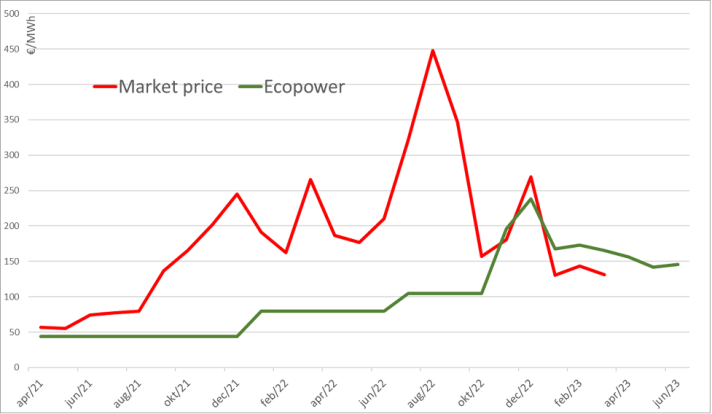
The current energy crisis has exposed the vulnerability of profit-oriented, fossil based, centralised energy systems. Energy cooperatives across the EU are providing local clean energy solutions as a way to build energy security, tackle energy poverty, and fight climate change. Their unique characteristics in pursuing social and ecological goals over profit should be acknowledged and supported by public EU funds, such as Cohesion and Recovery and Resilience funds.
Representing over 2250 energy cooperatives and 1,500,000 European citizens, REScoop.eu can be viewed as the bellwether of a burgeoning community energy movement. With a long history dating back to the first community-owned grids in Germany in the beginning of the 20th century, energy communities have grown exponentially where effective enabling frameworks were put in place. Historically, as niche ideas break into the mainstream, the risk of cooptation by the system rises. Incumbent and new actors are now actively resisting, or hijacking, the community energy movement. Over the next few years, public (EU) funds will be instrumental in scaling up the work of energy communities, thus placing them on an equal footing with other market actors.
COMMUNITY AND ENVIRONMENT OVER PROFIT
In the midst of an energy price crisis, caused partly by speculation and profiteering by private energy companies, some energy communities are effectively tackling energy poverty by maintaining energy prices at or close to cost level. Let us have a look at the cooperative producer/supplier Ecopower in Belgium who exemplifies this stark comparison. Throughout 2021-2022 it has kept prices remarkably lower than the market price (and any other supplier in the country).
Legally constituted to pursue social-ecological goals, over profit, energy communities naturally prioritize energy poverty reduction as a goal through soft skills (awareness and behavioural change), and technical interventions (PV, heat pumps, smart meters, insulation).
GETTING THE EQUATION RIGHT
All major EU public funds, such as Cohesion, Recovery and Resilience (and REPowerEU), Modernisation, and Just Transition funds, earmark unprecedented amounts of money for energy communities. This presents a clear opportunity to expedite a democratic and inclusive energy transition, but also opens the door to hijacking by profit-oriented entities.
There is no ‘one-size-fits-all’ formula for public support towards energy communities. Revolving grants-to-loans schemes, concessional loans and guarantees can help de-risk large investments, while unlocking private finance, as is the case in the Netherlands with Energie Samen’s Development Fund. In fact, EU citizens could mobilize up to 240 billion euros towards the energy transition by 2030. Direct grants, as through for example Italy’s Recovery and Resilience Fund (RRF), can boost ‘lighthouse’ projects, in countries where renewable energy communities are fairly new. To equip citizens with the right skills and know-how around setting up and managing energy communities, Spain is earmarking tens of millions of euros from its RRF, while setting up ‘Community Transformation Offices’, as relevant focal points across the country.
TACKLING CORPORATE CAPTURE
The -literally- million dollar question arises: Who should benefit from this public support? To tighten the screws around corporate-capture1, countries like Ireland and Germany have set strict criteria for citizen participation, autonomy, and geographic proximity in their support schemes.
Spain and Italy also lead by example: RRF and Cohesion funding for energy communities, is contingent on a range of social criteria including: guaranteed citizen participation, technological innovativeness level, inclusion of energy poor and disadvantaged households, gender balance, and self-consumption projects.
THE WAY FORWARD: A BULLETPROOF REGULATORY FRAMEWORK
Beyond setting strong social safeguards in financing schemes, all of the above countries have made important steps towards transposing the Renewable Energy Directive (REDII) and Internal Electricity Market Directive (IEMD). This ensures that public finance is only targeted towards energy communities that are citizen-led, open and voluntary, and whose main purpose is to deliver social and environmental benefits. The potential of community energy is enormous: by 2050, around 45 % of renewable energy production in the EU could come from citizens. National authorities, in close coordination with EU bodies, can help ensure that the true cooperative spirit of the movement remains alive.
1: We broadly define corporate capture as a phenomenon whereby non-citizen entities (mainly medium and large sized businesses) set up closed energy communities with the purpose of delivering private profit, rather than social and environmental benefits
Recommended links:
- https://www.rescoop.eu/toolbox/briefing-public-financing-opportunities-for-energy-communities-in-europe [This briefing provides an overview of the support provided to community energy in public financing programmes (Cohesion & Recovery and Resilience Funds). The goal of the publication is to inform energy communities and managing authorities about the state of play of public finances.]
-
A guide designed for managing authorities on how to design procurement criteria around energy communities: https://www.rescoop.eu/toolbox/procurement-guide-for-community-energy
-
Main opportunities and barriers to finance for energy communities : a report by Friends of the Earth Europe. https://friendsoftheearth.eu/publication/eu-energy-communities-barriers-opportunities-financing/
About the authors:
Dirk Vansintjan is president at REScoop.eu, the European federation of Citizen Energy Cooperatives. He is pioneer of renewable energy in Belgium. Co-founder of Ecopower (1991), one of the largest renewable energy cooperatives in Europe, producing 100 GWh of green electricity/year, supplying 1,7% of Flemish households.
Chris Vrettos is working as a finance project manager for REScoop.eu, the European Federation of Citizen Energy Cooperatives, focusing on financing, policy and advocacy. He also works for Electra Energy Cooperative, a social enterprise that promotes the active engagement of citizens in renewable energy production in Greece, the Balkans and abroad. He has worked on multiple research programs as an assistant, on topics such as the EU Green Deal and degrowth. He is interested in international climate politics and journalism and has attended multiple UNFCCC COPs.
Disclaimer: This article is a contribution from a partner. All rights reserved.
Neither the European Commission nor any person acting on behalf of the Commission is responsible for the use that might be made of the information in the article. The opinions expressed are those of the author(s) only and should not be considered as representative of the European Commission’s official position.
RELATED ARTICLES:
➔ Convergence of geopolitical, energy and climate crisis urges us to act and co-operate
➔ Social safeguards: the key to a successful renovation wave
➔ Climate leadership – what does it really mean?
Details
- Publication date
- 6 April 2023
- Author
- European Climate, Infrastructure and Environment Executive Agency

